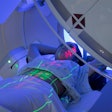Slight temperature increases of a head and neck cancer patient's oral mucous membranes during early chemotherapy and radiation therapy treatment are a predictor of severe mucositis later in treatment, according to a study presented at the recent Multidisciplinary Head and Neck Cancer Symposium in Phoenix.
Mucositis is a common chemoradiotherapy side effect that is painful and can be very severe for head and neck cancer patients. Practitioners have been unable to predict which patients will have mild mucositis or severe mucositis that would require narcotic pain medication, nutritional support, and/or feeding tubes.
Researchers from the University of Chicago hypothesized that using sensitive thermal imaging technology to measure temperature changes of less than one-tenth of a degree early in treatment could predict the severity of mucositis later in treatment. This knowledge could allow for early intervention and potential changes in therapy using a technology that is simple, harmless, and noninvasive.
For the study, patients receiving chemoradiotherapy underwent baseline and weekly thermal imaging of their oral mucous membranes. All patients displayed an increase in temperature, and severe mucositis was found in 53% of the patients.
"If we could predict which patients were going to suffer the greatest toxicity, we could proactively make changes to their care that could ameliorate or prevent side effects," stated lead study author Ezra Cohen, MD, the co-director of the head and neck cancer program at the University of Chicago, in a press release. "Ultimately, we could identify the patients at higher risk of severe complications from treatment."



















